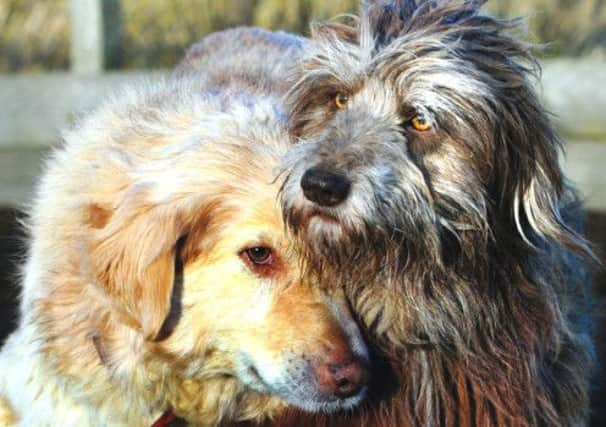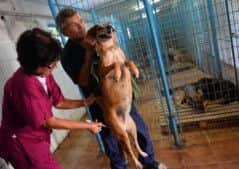How Scots are welcoming Romanian refugee dogs


Animal rescue shelters say they have received requests to house hundreds of dogs from Romania as thousands of strays are killed in a cull.
Romanian authorities in September launched a major crackdown on stray dogs after a four-year-old boy was killed by a dog in the capital Bucharest, where there are thought to be around 60,000 roaming the streets.
Advertisement
Hide AdAdvertisement
Hide AdThe authorities ordered that all dogs be collected from the streets and kept in municipal pounds for two weeks – then, if not rescued by an animal shelter or individual, they are killed.


Animal rights groups have protested against the conditions in which the dogs are kept and the often inhumane way they are killed. It is believed that many are poisoned or beaten to death.
The influx of Romanian dogs to Scotland comes as UK immigration authorities are bracing themselves for a wave of workers from the country, which, with Bulgaria, had restrictions lifted for working in Britain on 1 January.
Lorraine Jardine, owner of Islay Dog Rescue Centre in Ayrshire, has recently rehoused ten Romanian dogs.
“They are absolutely lovely dogs,” she said. “I usually take all my dogs from pounds in the UK and initially I was sceptical about taking on dogs from abroad.
“But when I saw the horrific conditions they are kept in, I had to do something about it. I just felt I had to help wherever I can.”
She added: “In Britain, the vast majority of the dogs we get are staffie cross breed –whereas these dogs are just a bit different and look lovely. They are attracting a lot of attention.”
Other Scottish shelters, including Any Dog’il Do Rescue in Edinburgh, are also advertising homeless Romanian dogs on their websites.
Advertisement
Hide AdAdvertisement
Hide AdThe rescue dogs are transported to the UK via the Channel Tunnel and are then collected from England by representatives from the Scottish shelters.
Suzanne Burt, who runs Any Dog’il Do, visited a public dog shelter in the Romanian town of Constanta last year.
“We were told by people in the town that the dogs are just beaten over the head and then incinerated – some of them are still alive when that happens,” she said. “When we went there, it wasn’t with the intention of saving any of the dogs specifically at that time, but when we saw the conditions they were in, I just felt I had to do anything I could.”
She plans to take in around 30 Romanian dogs this year –and has also donated money to shelters in the country to help ensure as many dogs as possible which cannot be brought to Britain are treated better.
Many dogs sent to rescue centres in the UK are co-ordinated by the European Alliance of Rescue Centres and Sanctuaries (Ears) – a continent-wide organisation which checks dogs before deeming them suitable to be rehoused in other countries.
Independent Romanian organisations are also believed to be advertising dogs online and driving them to Britain to be united with new owners.
To be granted access to Britain, the dogs need to have a pet passport – which requires them to be vaccinated against rabies, microchipped and treated for fleas and worms.
Katharine Mansell, spokeswoman for animal welfare charity WSPA said: “We have taken hundreds of calls and emails from members of the public in the UK, distraught at the prospect of a huge dog cull in Romania.
Advertisement
Hide AdAdvertisement
Hide Ad“The emotional response given by the Romanian Parliament to the alleged mauling of a child by stray dogs is already causing the suffering and death of many dogs and – as previous experiences show – is not even an effective solution to overpopulation problems. Hundreds of thousands of dogs have been killed in Romania over the last 20 years, but the problem continues to exist and expand.
“Wherever the problem of canine overpopulation has been effectively targeted, this has happened not by killing healthy dogs, but through the adoption and implementation of alternative policies, which Romania has not yet implemented at the national level.”
Stray dogs have roamed the streets of Romania for 30 years, since Communist dictator Nicolae Ceausescu knocked down historic town centre homes to make way for apartment blocks.
Families who were forced to downsize their living space turned their dogs loose on the streets. The animals have since bred and the number of stray dogs has rocketed. Bucharest is not the only Romanian city to be plagued by strays, with other major cities such as Iasi and Cluj also boasting large populations of dogs.
In the first eight months of 2013, almost 10,000 people in Bucharest were treated for dog bites by the Matei Bals Institute for Infectious Diseases, figures show. Some of the dogs suffer from rabies – which can be fatal to humans if bitten by an infected animal.